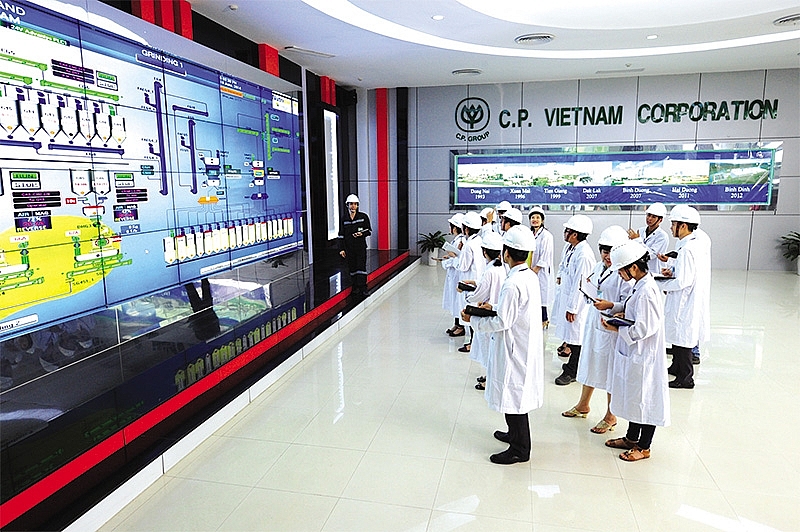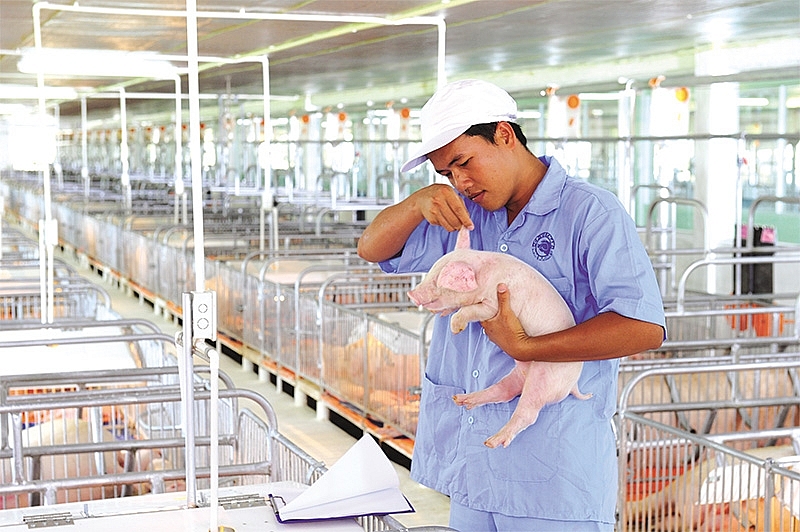Becoming the World's Kitchen
 |
| C.P. Vietnam has tied its business to local farmers to help each other to reach new heights and achieve greater growth through innovation and sustainable initiatives |
In order to realise the target of turning Vietnam into the world’s kitchen, C.P. Vietnam Corporation is building Southeast Asia’s most modern chicken slaughtering and processing plant with the total investment of $200 million and equipped with Industry 4.0 solutions in the southern province of Binh Phuoc. The weekly capacity of the factory is expected to reach one million chicken, equalling 50 million chicken per year.
The project aims to develop a closed loop production chain to minimise the chance of diseases in line with the World Organization for Animal Health (OIE), contributing to the sustainability of the husbandry industry and improving the value of local products, while boosting supply for the local market and export. Safe chicken meat from this factory is expected to be released in the local market and exported to Japan, South Korea, and Singapore from next April.
Additionally, C.P. Vietnam continues diversifying its processed food products with high quality, food safety and hygiene, as well as reasonable prices in mind to ensure that they suit which are suitable with the domestic consumption and export demand.
“The target of becoming the World’s Kitchen that we have been working towards over the world will be promoted and carried out in Vietnam by building more factories producing products like dumplings, ready meals, and jams to increase demand in Vietnam,” said Montri Suwanposri, director general of C.P. Vietnam.
 |
Based on the supply chain in Vietnam
People’s rising living standards lead to higher requirements for agricultural products. Thereby, over the past years, C.P. Vietnam, a subsidiary of Thailand’s Charoen Pokphand Group (C.P. Group), has been focusing on upgrading technology, and strengthening partnership with local farmers to develop a closed supply chain and improve the quality of Vietnam’s agricultural products.
Beginning as an animal feed producer with a pig farm in Binh Duong and Binh Phuoc provinces, setting foot in Vietnam over 31 years ago, C.P. Vietnam now has 90 branches across the country, covering the entire value chain from farm to food.
The corporation has seven factories producing animal feed in Hanoi, Hai Duong, Binh Dinh, Binh Duong, Dong Nai, Tien Giang, and Daklak, and three factories producing aqua feed in Dong Nai, Ben Tre, and Can Tho with the total annual capacity at 4.2 million tonnes. The raw materials for cattle feed, poultry feed, and aqua feed are all sourced from strictly supervised producers to control nutrition value and residues of banned substances.
Supplying the main ingredient of animal feed, corn processing factories constructed at the planting areas provide farmers a platform to take up their yield at a good price while ensuring the high quality of raw materials and products, as well as traceability. C.P. Vietnam also pays a lot of attention to transferring technology, cultivation, and processing material skills to farmers to improve their performance.
The new-generation animal feed factory builds a perfect system of mixing, sterilising, pelleting, and packaging to produce high-quality animal and aqua feed, improving the efficiency of animal feed conversion, reduce environmental pollution, and improve economic efficiency.
The company’s aqua feed production has already been certified for good management (ISO 9001:2008), good manufacturing practice (GMP), and Hazard Analysis and Critical Control Points (HACCP), ISO 22000, and GLOBALG.A.P. to ensure safety and traceability.
During farming, C.P. Vietnam selects genetic resources imported from the most prestigious companies in the world to create animal breeds for the corporation only, which are more disease resistant and bring higher benefits to farmers.
C.P. Vietnam’s supply chain not only benefits the corporation and customers, but also opens up a way for around 3,000 local farmers to join its supply chain. The collaboration has already created more than 20,000 jobs, transferred valuable technology and expertise to local farmers, and enlarged the market for their crops and livestock.
Thanks to the combination between the corporation and local farmers, C.P. Vietnam provides more than five million pigs annually to the market, 200 million eggs, 80,000 tonnes of chicken, and exports 20,000 tonnes of processed food to foreign markets like Australia, Japan, China, and Europe.
“We are very proud that products made in Vietnam are welcomed in other countries. This adds to the reputation not only of the corporation making these products, but also of the country,” said Montri Suwanposri.
In order to provide the highest-quality products, the company works with a closed production chain and strict supervision throughout the feed-farm-food process. The Phu Nghia food processing plant in Hanoi was built according to European standards with high technology to manufacture food that can be exported to European countries.
In addition to farming and animal feed processing, C.P. Vietnam also supplies dozens of high-quality processed food products like sausages, Vietnamese ham, Chinese sausages, and fried chicken. These fast food items are distributed at more than 6,000 points of sale including modern supermarkets, convenience stores, and traditional markets, while 500 places sell Five Star fried chicken, as well as 1,000 distribution points sell C.P. Vietnam’s fresh pork across the country.
Secret of success
In the long term, the collaboration with local farmers, expansion of manufacturing, investment into farms and factories, improving product quality, and strengthening exports are the main strategic objectives of C.P. Vietnam.
Since beginning operations a quarter century ago, the company’s farming productivity for pigs, chicken, shrimp, and fish has increased by 25 per cent, while the productivity of plants has increased by 30 per cent, while remaining price-competitive with rivals from more developed regional markets like Thailand and Malaysia.
“With the methodical investment strategy and the efforts of C.P. Vietnam’s officers, I believe that food processed from Vietnamese pork, chicken, shrimp, and fish will be on the table of households across the globe,” said the general director of C.P. Vietnam.
In order to achieve this dream, C.P. Vietnam is building on the 3-Benefit principle of benefiting the country, the people, and the company, which has so far proved the right path to follow, yielding even better outcomes than initially expected. The company has continuously been collaborating with local farmers to develop a modern and sustainable agriculture, as well as deliver safe food to local and international consumers.
What the stars mean:
★ Poor ★ ★ Promising ★★★ Good ★★★★ Very good ★★★★★ Exceptional
 Tag:
Tag:
Related Contents
Latest News
More News
- Masan Consumer names new deputy CEO to drive foods and beverages growth (February 23, 2026 | 20:52)
- Myriad risks ahead, but ones Vietnam can confront (February 20, 2026 | 15:02)
- Vietnam making the leap into AI and semiconductors (February 20, 2026 | 09:37)
- Funding must be activated for semiconductor success (February 20, 2026 | 09:20)
- Resilience as new benchmark for smarter infrastructure (February 19, 2026 | 20:35)
- A golden time to shine within ASEAN (February 19, 2026 | 20:22)
- Vietnam’s pivotal year for advancing sustainability (February 19, 2026 | 08:44)
- Strengthening the core role of industry and trade (February 19, 2026 | 08:35)
- Future orientations for healthcare improvements (February 19, 2026 | 08:29)
- Infrastructure orientations suitable for a new chapter (February 19, 2026 | 08:15)





















 Mobile Version
Mobile Version